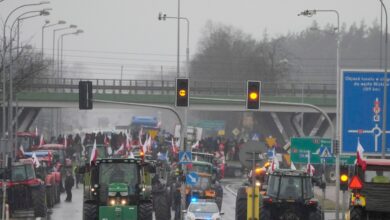The olive tree, symbol of Palestine and mute victim of Israel’s war on Gaza
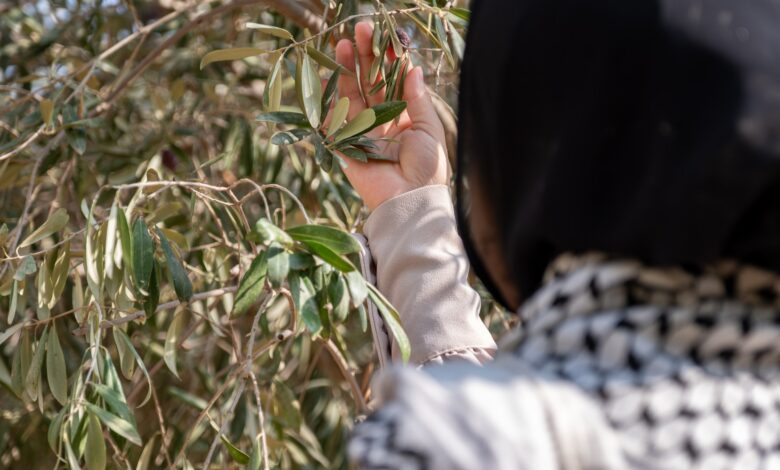
Al-Fukhari, Gaza – Ahlam Saqr, 50, cried on the morning her sons started cutting branches off her olive trees to burn them for fires to cook, stay warm and heat water for bathing.
It was a matter of survival, she says, to enable the family to make it through the relentless Israeli bombing of Gaza. But that did not make it any easier to watch her four beloved trees being taken apart.
“The house felt so empty. The trees had their place in the house and it became dark when they were gone. We have beautiful memories with them,” she said.
Forced to lose ‘life companions’
Gaza is under a brutal Israeli bombardment and siege that has displaced most of its population and at the same time prevented fuel, gas for stoves, and other essentials from entering.
In the midst of human misery and crisis, a series of other tragedies have unfolded as families are forced to destroy their trees in order to have firewood for survival.
To have to destroy one’s own olive trees, one of the most enduring symbols of Palestine, is a wound that cuts deep and has left different-shaped scars in the hearts of the people who spoke to Al Jazeera.

Ahlam is not the only person in Gaza who has had to part with beloved trees just to be able to feed the family and keep everyone warm. In many homes, people are mourning having to destroy these living, breathing witnesses to family history.
“I used to tell everyone that my trees have been my life companions. They’ve been there as I raised my children here; they’ve seen all the stages of our lives,” Ahlam told Al Jazeera.
Khaled Baraka, 65, also grieves for his trees, but he is not actually sure what state they are in today because he was forced to flee from his home in Bani Suheila six weeks ago.
“I was displaced … when Israeli tanks entered the city of Khan Younis, we were already having a hard time.
“My orchard and fields were right next to our house, and we had already started to burn branches,” he said.
By the time Khaled and his family fled Bani Suheila, half the trees were gone, cut down a little at a time for the family’s needs or because the neighbours had come around begging for firewood to keep their own children warm and fed.
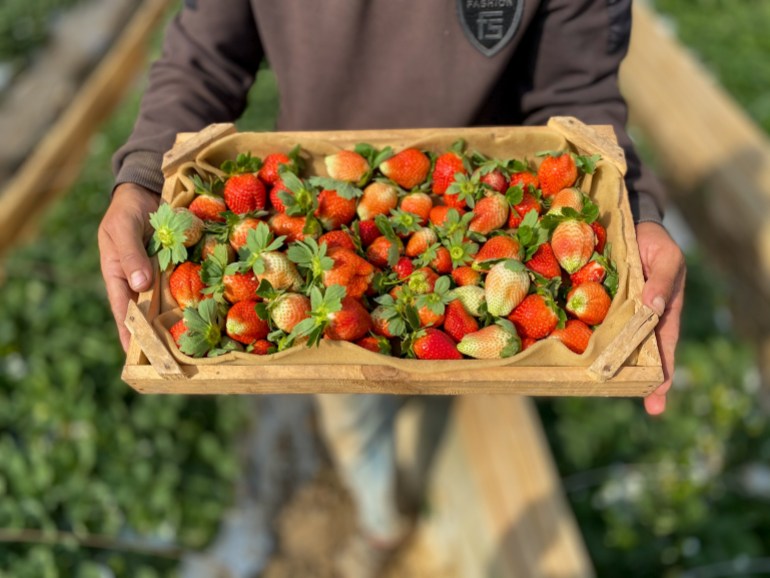
“To make bread, you need a fire,” he said bitterly. “How else was it supposed to happen? There were so many different types of trees. Guava, lemon, orange, and olive – they were all being cut down and I’m sure that once the occupation forces took the area they destroyed whatever was left.”
Khaled inherited his trees from his father, he told Al Jazeera, and most of them are at least 70 years old
“These trees lived through my moments of joy and sadness,” he said. “They know my secrets. When I was sad and worried, I would talk to the trees, take care of them … but the war killed those trees.”
‘The trees were my friends’
Fayza Jabr, 60, has lived alone for 10 years, since her husband passed away. The couple had no children.
About seven years before her husband’s death, she planted two olive trees, a lemon tree and a clementine tree around her house and spent her time taking care of them and watching proudly as they matured and bore fruit.
“They were my friends, part of my life,” Fayza said. “When a tree was in fruit, I’d call the neighbour’s son, Abboud, who’s 11. He would help me pick the fruit and prune trees that needed it.
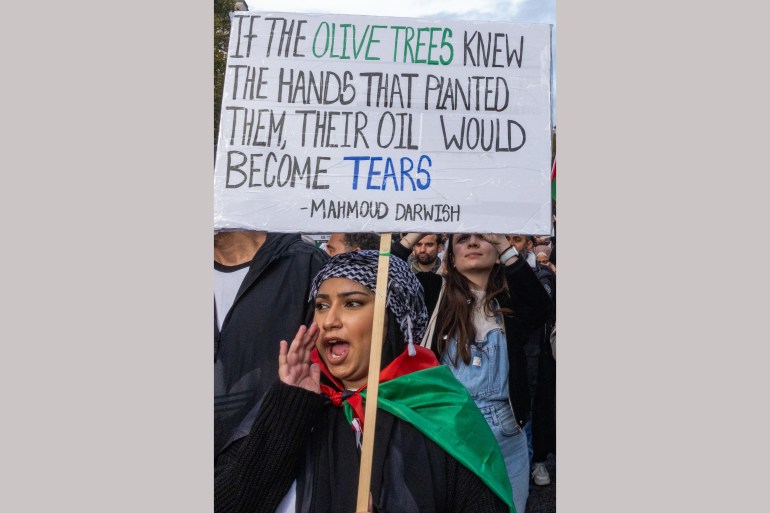
“I didn’t want to build a wall around my house so I could see the trees from inside and so the people walking by could enjoy the green.
“In mid-October, my brothers and sisters, their children and grandchildren were displaced to my home in Khan Younis – more than 30 people in my little house, all of them needing food and bread. To manage that, we ended up having to use the trees to light fires.”
At first, Fayza continued, it was possible to find bags of firewood in the market and to scrape together $30 to buy a bag that would last two days.
But eventually, that supply ran out and her sisters would wake at dawn to scavenge for anything to feed the fire. All sorts of things were burned: fabric, plastic, even shoes.
“It was olive season at the end of October, so I asked my family to help me pick the olives, not knowing that that would be the farewell season for my trees.
“I think I was lucky to have been able to pick olives from my two trees. They’re more than 17 years old. If they were my children, they’d be teenagers.
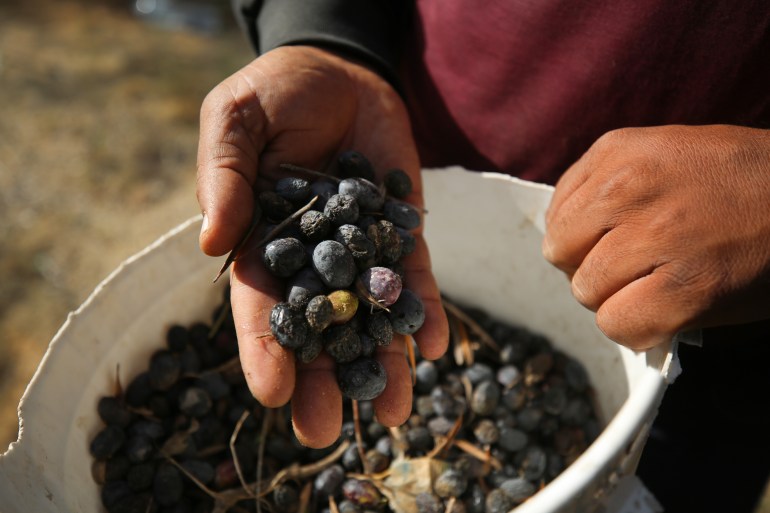
“About a month after the harvest, I noticed that some of the branches were broken off so I asked my sisters about them. They told me they were forced to cut down the trees because there was no other solution. Now the garden is barren. We had to rip the trees up by the roots to use every last bit.
“I was sad. It’s hard for me to cut down my trees, but I can’t be angry because there are children in the house who need to eat.”
The unspeakable richness of four trees
Ahlam moved to her house in al-Fukhari about 20 years ago, after Israeli forces destroyed the family’s first home near Khan Younis.
“UNRWA [the United Nations Relief and Works Agency for Palestine Refugees] built these houses for us after we’d been displaced for a couple of years, me, my husband and our six children, moving from one temporary shelter to another. I was so happy, the new homes had space to plant trees and other things around them. There’s nothing like plants to make a place feel comforting.

“When the municipality workers came around to give each home two olive trees, I sweet-talked them into giving me four instead, and I was so pleased with those four trees, it was like I owned a whole orchard.
“My daughter Israa could only study among these trees. She loved them, too. But since the beginning of the war, we’ve needed to light fires for cooking and it’s a painful journey to search for wood. We used everything, even plastic water pipes one day, and they smelled so bad that even the food tasted different.
“My sons eventually suggested that we cut down trees. At first, they said only one tree and the war wouldn’t last long. But the war didn’t stop and now all the trees are gone,” Ahlam said.
“We’ve lost so much in this war, it’s not going to end the trees that were like our children,” Khaled said, resigned.
“We grieve for these trees, but there is no other solution.”



